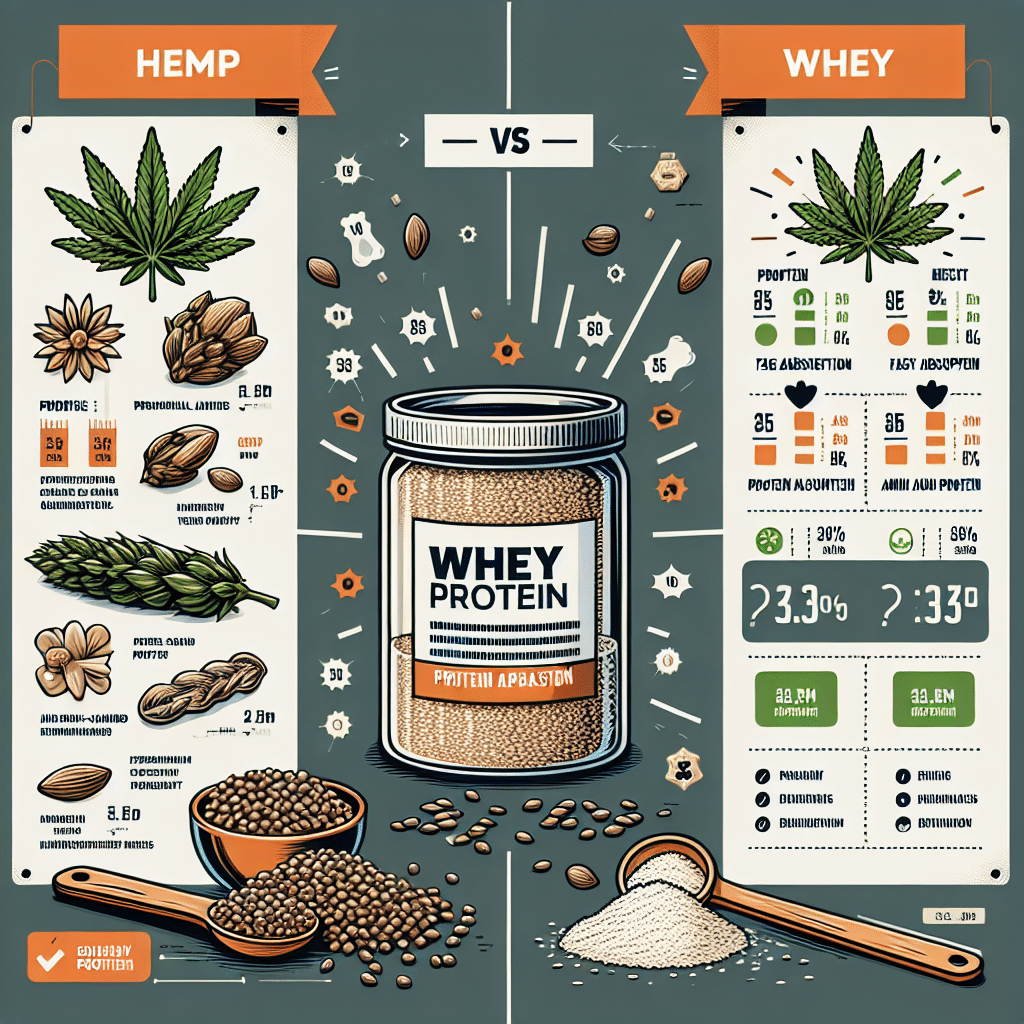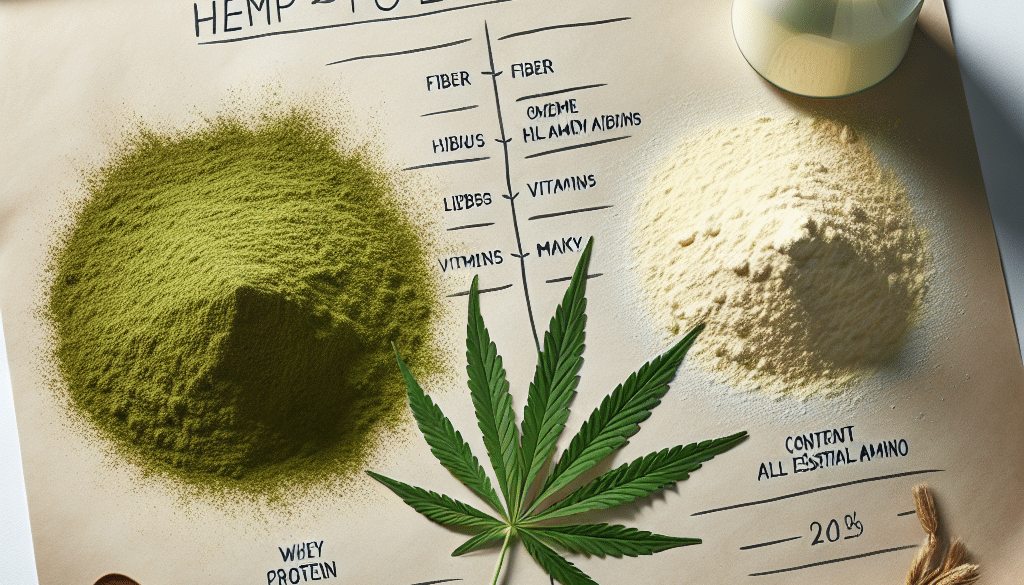What’s The Difference Between Hemp And Whey Protein?
-
Table of Contents
- Hemp vs. Whey Protein: Understanding the Differences
- Nutritional Profile Comparison
- Digestibility and Absorption
- Allergenic Potential and Dietary Restrictions
- Environmental Impact
- Taste and Mixability
- Use Cases and Applications
- Conclusion: Choosing the Right Protein for You
- Explore ETprotein’s Premium Protein Selection
Hemp vs. Whey Protein: Understanding the Differences

Protein supplements are a staple in the diets of athletes, bodybuilders, and health-conscious individuals. Among the plethora of protein sources available, hemp and whey protein stand out for their unique benefits and characteristics. This article delves into the differences between hemp and whey protein, providing insights into their nutritional profiles, digestibility, environmental impact, and more.
Nutritional Profile Comparison
When choosing a protein supplement, understanding the nutritional content is crucial. Here’s how hemp and whey protein stack up against each other:
- Hemp Protein: Derived from the seeds of the Cannabis sativa plant, hemp protein is a complete protein containing all nine essential amino acids. It’s also rich in fiber, omega-3 and omega-6 fatty acids, vitamins, and minerals. Hemp protein typically contains around 15 grams of protein per 30-gram serving.
- Whey Protein: Whey protein is a by-product of cheese production and is a complete protein as well. It’s known for its high bioavailability and rapid absorption. Whey protein concentrates can contain between 70-80% protein, while isolates can be 90% or higher. A standard 30-gram serving of whey protein provides about 25 grams of protein.
Digestibility and Absorption
The rate at which protein is digested and absorbed by the body can influence its effectiveness in muscle repair and growth:
- Hemp Protein: Hemp protein contains dietary fiber, which can slow down digestion. While this may be beneficial for digestive health, it means that the amino acids from hemp protein are released more slowly into the bloodstream.
- Whey Protein: Whey protein is known for its fast absorption rate, making it a popular post-workout choice. The rapid delivery of amino acids to muscles can aid in quicker recovery and muscle synthesis.
Allergenic Potential and Dietary Restrictions
Food allergies and dietary restrictions can significantly influence the choice of protein supplement:
- Hemp Protein: Hemp protein is a plant-based option that is naturally free from dairy, soy, and gluten, making it suitable for vegans and individuals with certain food allergies or intolerances.
- Whey Protein: Whey protein is derived from milk and may not be suitable for those with lactose intolerance or dairy allergies. However, whey isolate undergoes additional processing to remove most of the lactose and fat, which may make it tolerable for some individuals with sensitivities.
Environmental Impact
The production of protein supplements also has varying environmental footprints:
- Hemp Protein: Hemp is a sustainable crop that requires minimal water and pesticides. It also has a positive impact on soil health and can be grown in a variety of climates.
- Whey Protein: Dairy farming, which produces the whey used in these supplements, has a more significant environmental impact. It requires more water and land and contributes to greenhouse gas emissions.
Taste and Mixability
The flavor and texture of protein powders can affect their palatability and versatility in recipes:
- Hemp Protein: Hemp protein has a nutty, earthy taste and a grittier texture compared to other protein powders. It may not mix as smoothly in liquids.
- Whey Protein: Whey protein is often preferred for its smoother texture and ability to blend well with liquids. It comes in various flavors, making it a versatile ingredient in shakes and other recipes.
Use Cases and Applications
Depending on your goals and preferences, you might choose hemp or whey protein:
- Hemp Protein: Ideal for those seeking a plant-based protein with additional fiber and nutrients. It’s also a good choice for individuals with dietary restrictions.
- Whey Protein: Favored by athletes and bodybuilders for its high protein content and rapid absorption, which can optimize muscle recovery and growth.
Conclusion: Choosing the Right Protein for You
In conclusion, both hemp and whey protein have their unique advantages. Hemp protein offers a plant-based alternative with a rich nutrient profile, while whey protein is lauded for its high protein content and fast absorption. Your choice should align with your dietary needs, ethical considerations, and personal health goals.
For those interested in exploring high-quality protein options, ETprotein company’s range of products is worth considering.
Explore ETprotein’s Premium Protein Selection
ETprotein offers a diverse array of organic bulk vegan proteins, including hemp protein, that cater to various dietary preferences and health requirements. Their products are characterized by a neutral taste, non-GMO, and allergen-free attributes, ensuring that you receive the highest quality protein supplements. Whether you’re looking for plant-based proteins or other nutritional solutions, ETprotein has you covered.
About ETprotein:
ETprotein, a reputable protein and L-(+)-Ergothioneine (EGT) Chinese factory manufacturer and supplier, is renowned for producing, stocking, exporting, and delivering the highest quality organic bulk vegan proteins and L-(+)-Ergothioneine. They include Organic rice protein, clear rice protein, pea protein, clear pea protein, watermelon seed protein, pumpkin seed protein, sunflower seed protein, mung bean protein, peanut protein, and L-(+)-Ergothioneine EGT Pharmaceutical grade, L-(+)-Ergothioneine EGT food grade, L-(+)-Ergothioneine EGT cosmetic grade, L-(+)-Ergothioneine EGT reference grade and L-(+)-Ergothioneine EGT standard. Their offerings, characterized by a neutral taste, non-GMO, allergen-free attributes, with L-(+)-Ergothioneine purity over 98%, 99%, cater to a diverse range of industries. They serve nutraceutical, pharmaceutical, cosmeceutical, veterinary, as well as food and beverage finished product distributors, traders, and manufacturers across Europe, USA, Canada, Australia, Thailand, Japan, Korea, Brazil, and Chile, among others.
ETprotein specialization includes exporting and delivering tailor-made protein powder and finished nutritional supplements. Their extensive product range covers sectors like Food and Beverage, Sports Nutrition, Weight Management, Dietary Supplements, Health and Wellness Products, and Infant Formula, ensuring comprehensive solutions to meet all your protein needs.
As a trusted company by leading global food and beverage brands and Fortune 500 companies, ETprotein reinforces China’s reputation in the global arena. For more information or to sample their products, please contact them and email sales(at)ETprotein.com today.














